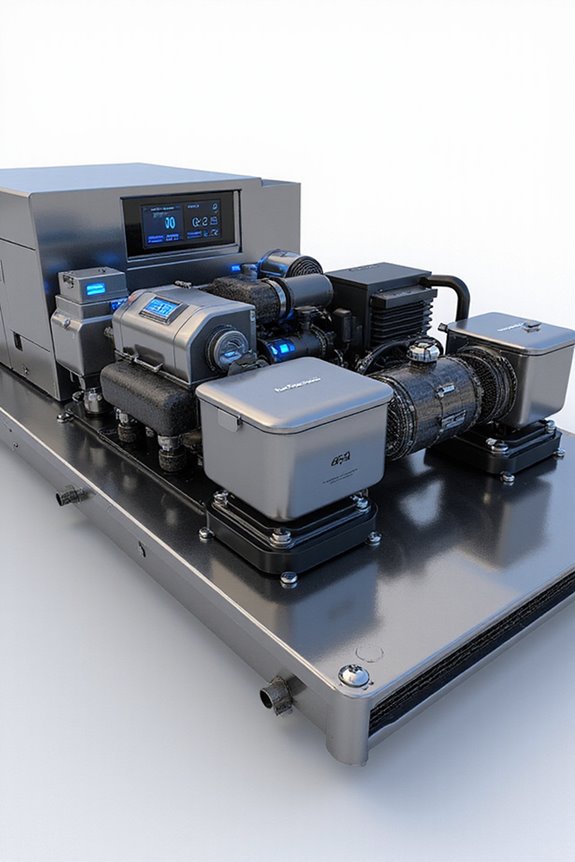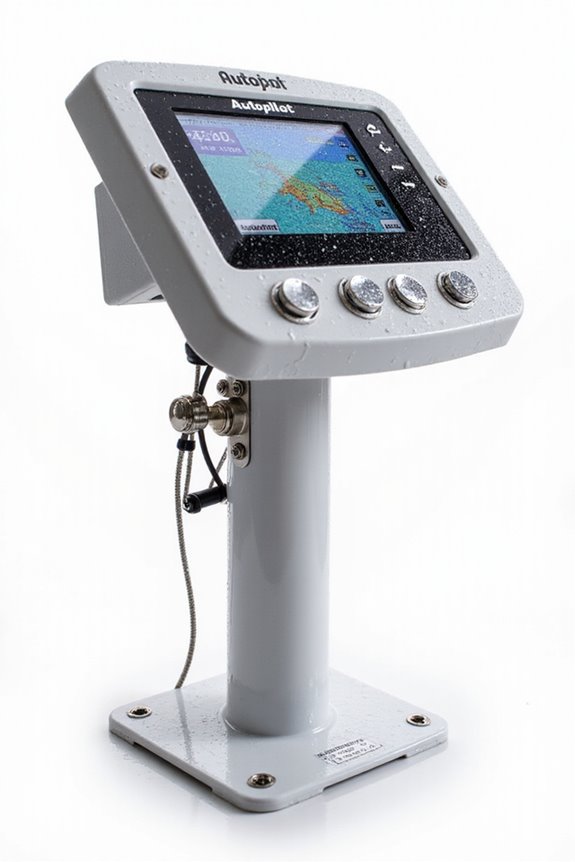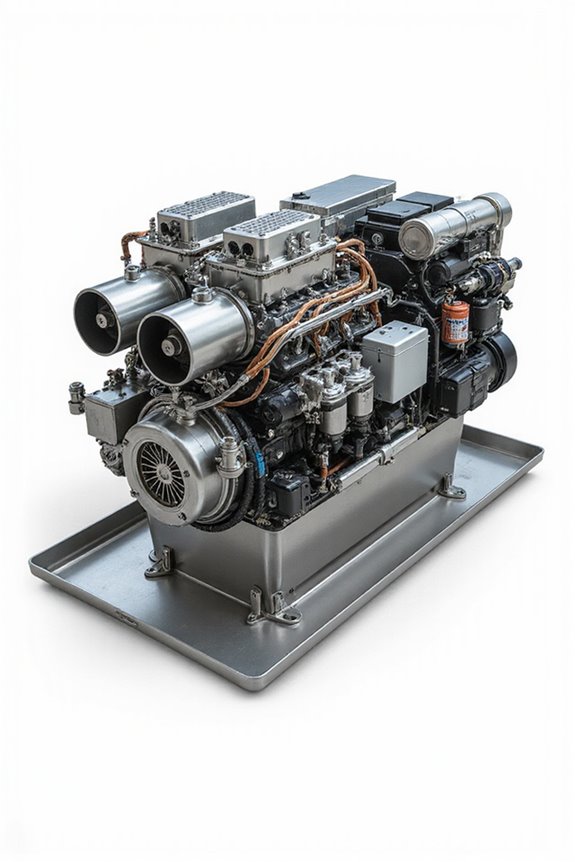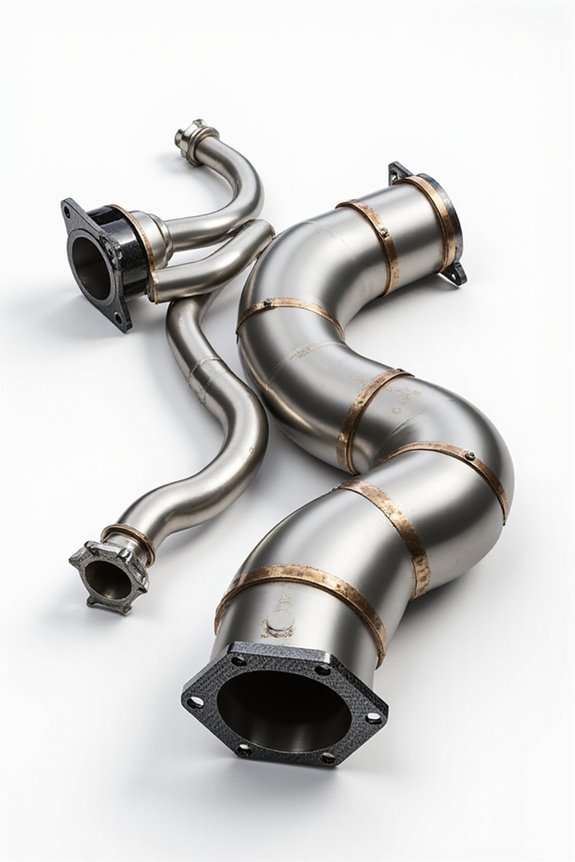If we want to maximize fuel efficiency on our yachts, hybrid systems are a smart move. They combine diesel engines with electric motors, letting us switch to silent, low-speed electric cruising while saving up to 30% on fuel. Plus, batteries recharge through sailing, so we’re not constantly refueling. It’s quieter, cleaner, and easier on maintenance—bonus for marine life and our wallets. Curious how all these parts work together to keep us cruising greener and longer?
Key Takeaways
- Use hybrid systems to combine diesel and electric power, optimizing fuel use based on cruising speed and conditions.
- Employ regenerative charging to recharge batteries during sailing, reducing fuel consumption.
- Switch seamlessly between diesel for speed and electric mode for low-speed cruising to maximize fuel savings.
- Optimize hull design and control systems to minimize drag and improve overall propulsion efficiency.
- Monitor and manage energy distribution with advanced control systems for consistent, efficient fuel use.
Understanding Hybrid Propulsion in Yachts
Even if you’re new to yachting tech, you’ve probably heard about hybrid propulsion—but what exactly does it mean? In simple terms, hybrid propulsion in yachts combines diesel and electric power sources to drive the vessel, sometimes independently, sometimes together. We get two main hybrid configurations: serial and parallel, which describe how engines and propellers work as a team. What’s really cool is the advanced power management that lets us switch smoothly between electric and diesel modes, or even combine them for a boost. This isn’t just about saving fuel; it’s about flexibility—imagine silently cruising a marina on electric or flexing diesel muscle when you need speed. Whether you’re into sailboats or motor yachts, understanding these basics helps us appreciate how hybrid technology makes yachting smarter and greener.
Key Components of Hybrid Yacht Systems
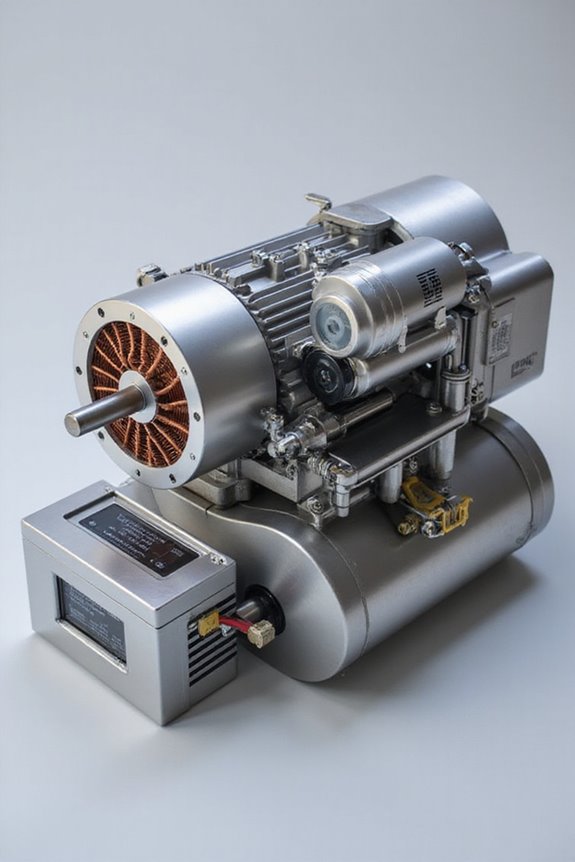
Since hybrid yachts blend traditional and electric power in clever ways, it’s helpful to know the main parts that make these systems tick. At the heart, we’ve got combustion engines and electric motors working in harmony—whether through parallel systems, where both can power the propeller, or serial systems, where engines charge batteries that then drive motors. Battery technology plays a big role, storing energy efficiently for smooth rides. Control systems are like the brain, handling complex energy management to keep things running seamlessly. Thanks to modular design, components can be swapped or upgraded without headaches. So, whether you’re cruising quietly or racing the waves, understanding these key parts can help us appreciate just how smart hybrid yachts really are. Pretty impressive, right?
How Hybrid Yachts Achieve Fuel Efficiency
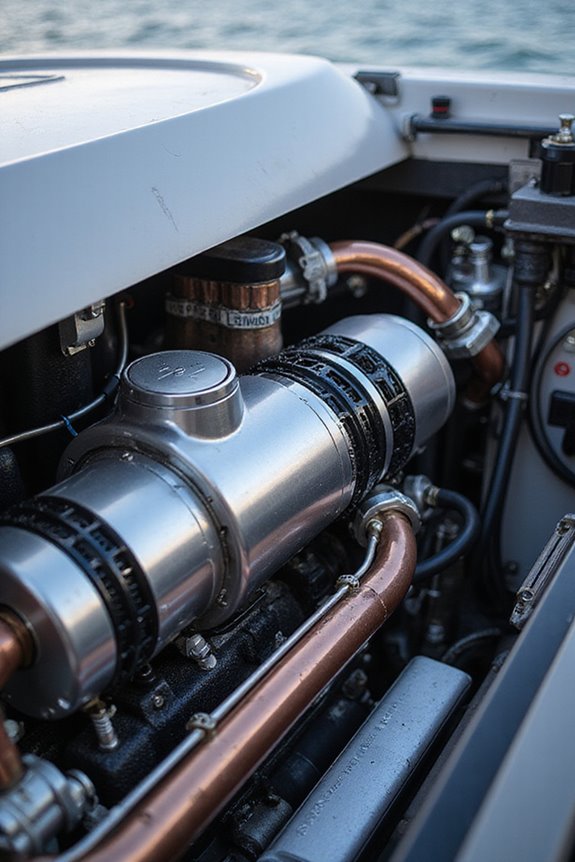
While hybrid yachts might sound like a high-tech mystery, the way they achieve fuel efficiency is actually pretty clever—and pretty practical for anyone who loves spending time on the water without burning through fuel. Hybrid technology gives us the best of both worlds, switching seamlessly between diesel engines for speed and electric motors for quiet, low-speed cruising. This smart fuel optimization means we save up to 30% on fuel compared to traditional yachts. Plus, regenerative systems recharge batteries as we sail, keeping electric power ready to go. The hull design and control systems also team up to reduce drag and manage power just right. So, by cruising smart and using this tech, we can enjoy longer trips, lower costs, and a smoother ride—doesn’t that sound like a win?
Environmental Benefits of Hybrid Propulsion
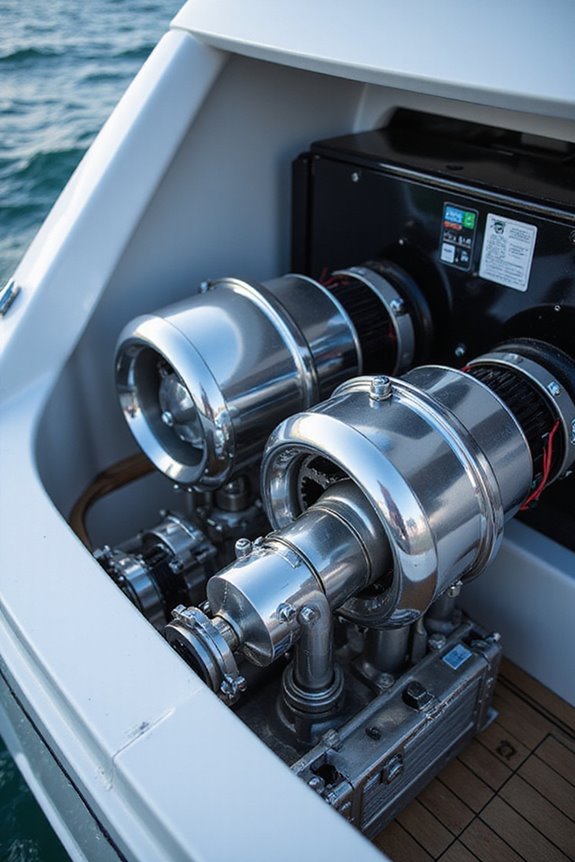
Now that we see how hybrid yachts cleverly stretch every drop of fuel, it’s worth looking at how they lighten our environmental load too. By cutting CO₂ emissions by up to half and running silently on electric power, hybrid systems champion sustainable boating in a big way. Imagine cruising through protected areas without leaving a trace—your hybrid yacht’s whisper-quiet and emission-free mode does just that, helping preserve fragile marine ecosystems. Plus, less noise means happier fish and peaceful waters. It’s not just about being eco-friendly; it’s about joining a community that cares for our oceans, ensuring these waters stay vibrant for future generations. So, when you choose hybrid propulsion, you’re stepping into a cleaner, quieter, and more responsible way to enjoy yachting. Who wouldn’t want that?
Operational Advantages of Hybrid Yachts
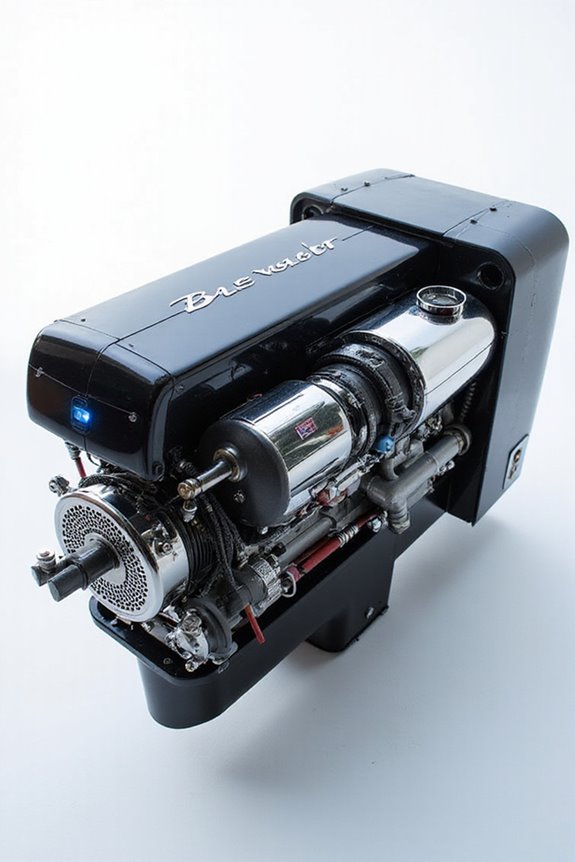
Whenever we talk about hybrid yachts, the conversation naturally sails toward their operational perks — and we’re glad it does. One big win is passenger comfort; hybrid systems seriously quiet down vibrations and noise, creating a peaceful onboard vibe that everyone appreciates. But it’s not just about lounging in silence. Hybrid yachts deliver real operational flexibility, letting us switch seamlessly between electric and diesel modes depending on where we’re cruising or what conditions we face. Want to sneak into a quiet cove without disturbing marine life? Electric mode’s got you covered. Plus, with fewer moving parts, maintenance worries drop, and safety improves because the electric system acts as a backup in a pinch. So, not only do hybrid yachts run smarter, but they make every journey smoother and more enjoyable for all aboard.
Cost Savings Through Reduced Fuel Consumption
Cutting fuel consumption by up to 30% might sound like a dream, but with hybrid yachts, it’s very much a reality we can all benefit from. When we look at fuel cost, the savings are clear—especially since hybrid systems let us use electric power during low-speed cruising, reducing diesel use and stretching every gallon. It’s not just about spending less at the pump; by combining diesel and electric power smartly, we optimize fuel efficiency depending on conditions. Have you ever wondered how much you might save over a season? A simple savings analysis shows these reductions add up, making a hybrid yacht a smart, long-term investment for us who want to enjoy the water without watching fuel bills sail away. Who doesn’t love saving some cash?
Innovations Driving Hybrid Yacht Performance
Although hybrid yachts have been around for a while, the innovations driving their performance continue to impress and surprise us. We see remarkable performance enhancements, like combining electric motors with variable speed generators for smoother, quieter rides—think speeds up to 14 knots without the usual engine roar. Propulsion innovations such as regenerative sailing turn kinetic energy into power, boosting efficiency while we cruise. Lightweight materials and advanced hull designs also play a part, making yachts faster and more fuel-efficient. Have you noticed how silent electric mode improves comfort and cuts noise pollution? These advances aren’t just about tech; they’re about creating a better experience for us all on the water. So, let’s appreciate how hybrid systems are redefining yacht performance in smart, sustainable ways.
Future Trends in Hybrid Yachting Technology
We’ve seen how innovations in hybrid yacht systems already make our time on the water smoother and more eco-friendly, but what’s on the horizon? Emerging technologies like hydrogen fuel cells promise zero-emission cruising, taking eco-friendly yachting to the next level. Plus, lithium-ion batteries paired with solar power keep pushing efficiency higher, while AI helps predict maintenance issues before they become weekend spoilers. Market dynamics show Europe leading adoption, with Asia-Pacific catching up fast, driven by stricter emission laws and growing appetite for sustainable marine tourism. Think luxury yachts outfitted with smart systems for maximum comfort and silent operation — who wouldn’t want that? As we embrace these future trends, it’s clear hybrid technology isn’t just a passing wave; it’s charting a course toward greener, smarter yachting for all of us.
Frequently Asked Questions
How Long Does the Battery Last During Electric-Only Operation?
It is understood battery lifespan varies, but for electric-only operation, the electric range usually depends on capacity and usage. Together, let’s consider proper maintenance to extend battery lifespan, ensuring we get the most from our electric journeys.
Are Hybrid Yachts Eligible for Government Incentives or Subsidies?
Like planting seeds for a greener future, we can benefit from incentive programs and tax benefits when choosing hybrid yachts. Together, we qualify for government support, fueling our shared journey toward sustainable and eco-friendly yachting adventures.
What Maintenance Differences Exist Between Hybrid and Traditional Yacht Engines?
When we compare engine upkeep, hybrid yachts require less due to fewer moving parts, and fuel management becomes more efficient. This means less hassle and more reliable, cost-effective cruising, making us feel confident and connected in our journey together.
Can Hybrid Systems Be Retrofitted to Existing Yachts?
Sure, retrofitting hybrid systems onto existing yachts sounds simple—if you ignore retrofit challenges and eye-watering installation costs. But as a community, we recognize these hurdles lead to long-term gains that truly unite us in innovation and sustainability.
How Does Hybrid Propulsion Affect Yacht Resale Value?
We’ve noticed market trends reveal hybrid propulsion’s impact on resale factors is mixed; while eco-conscious buyers value reduced emissions, uncertain infrastructure and higher costs create hesitations—yet together, we’re shaping growing acceptance and stronger future demand.

